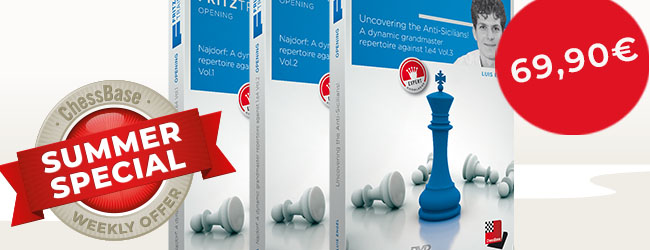Decide the World Championship by classical chess
The tie-break systems that are currently used in chess are designed to break ties between players who have the same total number of points after the last round. This is especially necessary when prizes such as titles, trophies, or qualification for another tournament cannot be shared. And of course in the World Championship, where there is a title to be awarded. But here the system used to break a tie between two players is either:
- the challenger needs to win; or
- rapid and blitz games, including the ominous Armageddon.
Nobody cheers when a World Championship takes course, it did last year.
Wikipedia describes how it continued: "Before the tiebreak, it was expected that Carlsen would be advantaged because of his prowess at rapid time controls. Although the rating gap between Carlsen and Caruana in classical chess was a mere 3 points, in rapid chess it was 91 points. However, Carlsen's showing in the classical games, and the way in which he offered a draw in a favourable position in game 12 led Kasparov to opine that Carlsen appeared to be losing his nerve. But this was the result:
- Game 01: Caruana ½–½ Carlsen
- Game 02: Carlsen ½–½ Caruana
- Game 03: Caruana ½–½ Carlsen
- Game 04: Carlsen ½–½ Caruana
- Game 05: Caruana ½–½ Carlsen
- Game 06: Carlsen ½–½ Caruana
- Game 07: Carlsen ½–½ Caruana
- Game 08: Caruana ½–½ Carlsen
- Game 09: Carlsen ½–½ Caruana
- Game 10: Caruana ½–½ Carlsen
- Game 11: Carlsen ½–½ Caruana
- Game 12: Caruana ½–½ Carlsen
Tie-break games
- Game 13: Carlsen 1–0 Caruana,
- Game 14: Caruana 0–1 Carlsen
- Game 15: Carlsen 1–0 Caruana
Both players were gracious in the press conference after the match, and paid tribute to their opponent. Caruana said the results showed that Carlsen is the strongest player in the world, while Carlsen said Caruana had just as much right as he has to call himself the best player in the world in classical chess. Carlsen's strategy to draw game 12 and win the tiebreaks had been vindicated, a point he emphasized in the press conference. Both players recognized that the other was a formidable opponent. Carlsen said he was very happy for having overcome such a strong obstacle, and would work to get better in the future. For his part, Caruana lamented the fact that one needs to find one's best form to win a tiebreak, which he wasn't able to do, but he looked forward to making another title attempt in the future.
A proposal
Recently we received a letter from Werner Keym, who is a teacher (of French and Latin) and is one of the most creative problemists in the world. He is also a profound thinker in all things related to chess, and came up with the following interesting proposal:
Current rules
For Swiss chess tournaments for individuals (not teams), FIDE recommends — in an Annex to the FIDE Tournament Regulations regarding tiebreaks:
- The result of the direct encounter(s) between the players (if any)
- The greater number of wins
- The greater number of games with Black (unplayed games shall be counted as played with White)
- The Average Rating of Opponents Cut (the average rating of opponents, excluding one or more of the ratings of the opponents, starting from the lowest-rated opponent)
- Buchholz Cut 1 (the Buchholz score reduced by the lowest score of the opponents)
- Buchholz (the sum of the scores of each of the opponents of a player)
Sonneborn-Berger
The Chess World Championship Match should be decided neither by rapid chess nor by blitz chess nor by Armageddon, at the end of the match, but instead by classic chess. For this the World Championship match should be split into of two parts: a prologue and the match itself.
1. Prologue
1.1 This consists of four classic chess games.
1.2 The player with the lower Elo rating plays white in the first game.
1.3 The player who gets more than two points is the prologue winner.
1.4 In case of tie (2:2) the player with the higher Elo rating is the prologue winner.
1.5 We now have a prologue winner and a prologue loser.
2. Match
2.1 This consists of twelve classical chess games.
2.2 The prologue loser plays white in the first game.
2.3 If the prologue loser gets more than six points in the match, he will be the champion.
2.4 If the prologue winner gets at least six points, he will be the champion.
Comments
- Lots and chance play no role
- Conditions for the champion and the challenger are equal
There are at most 16 classic chess games
- The prologue will take at most four days
- In the prologue the player with the lower Elo number has nothing to lose and must play aggressive for a win
- The player with the higher Elo, however, only needs to play for a draw
- The championship match is decided in at most 12 games and there may be much excitement towards the end: in case of a drawn score in the 12th game the prologue loser must win, whereas the prologue winner must at least draw
- The match will end by a fixed day — this is important for organizers, sponsors, media, and audiences
- The process is similar to gaining the pole position in F1 racing — a favourite is found in advance, and gets an advantage due to his pre-race performance. But it can be taken away during the race itself.
Tell us what you think of the proposal of Werner Keym. Should World Championship matches in the future be held in this way? Please comment in our feedback section below.























